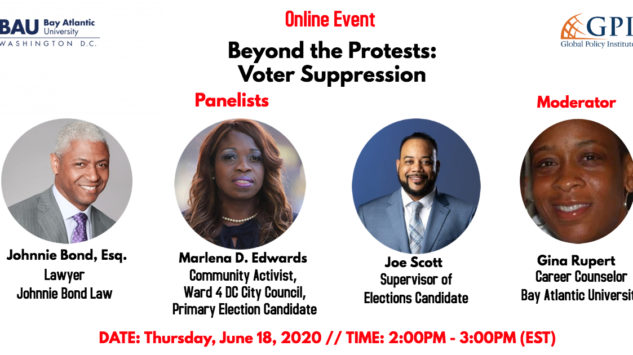Events

Online Event: Beyond the Protests: Voter Suppression
The tragic events of the last few weeks illustrate once more how unjustifiable police brutality far too often targets African Americans. But there is more. In several states various measures passed by the legislatures can be construed as artful ways to make it more difficult or impossible for eligible African Americans to exercise their constitutional right to vote.
After the Civil War, the 15th Amendment was ratified in 1870. It prohibited states from denying a male citizen the right to vote based on “race, color or previous condition of servitude.” However, soon thereafter the 15th Amendment was successfully circumvented by segregationists in Southern States.
The Voting Rights Act of 1965 put an end to those unconstitutional measures and restored the right to vote for African Americans who had been for all practical purposes deprived of their constitutional right to vote.
Sadly, the issue has risen again in recent years, in the form of measures introduced in various states that amount to “voter suppression”. They impact primarily low income people and African Americans. It is really important to shed light on this phenomenon and fight it until all Americans, regardless of race, will be able to fully enjoy all their constitutional rights. As important reforms are being discussed, at the Federal and State level, the right of all US citizens to participate in all elections, cast their votes and have their voices heard, must be guaranteed.
Moderator Rupert opened the discussion by pointing out the many instances in which various states legislatures have passed laws that create obstacles to exercise the right to vote and how these laws seem to target minorities. Edwards commented that there are now too many rules enacted at the state level. She argued that we need a national effort to create clear and transparent rules that eliminate all discrimination. Scott added that Florida, his state, is at the forefront of this battle and how awareness of the threat should help mobilize public opinion against any efforts to restrict the ability to vote. Bond emphasized that there is a need for all out engagement. People have to embrace the idea of “voting as lifestyle”. This notion includes continuous activism, demonstrations aimed at attracting attention to the issue and more.
Regarding the related problem of people who served prison sentences and as a result are deprived of their right to vote, Edwards noted that there is no guidance for former prisoners. In most cases they do not know whether they can or cannot vote. There is a need to bring awareness, to explain the existing laws and inform people. Scott pointed out that in his state of Florida laws that make it illegal for convicted felons to vote clearly has a racial bias. This attitude, mixed with lack of clarity about what applies to whom conveys the message that is better not to try to go and vote. Bond argued that there is no logical connection between having served a prisoner term and being deprived of the right to vote. The whole idea needs to be exposed and discredited. Edwards added that it is important to use this moment of greater national awareness about discrimination to bring attention to the issue.
And additional problem is the gray area of transgender citizens who may be trapped in gray areas. As they do not conform to established categories, often they cannot vote. All agreed that there is a need to reaffirm the principle that all Americans have a right to vote. There are no exceptions to this constitutional principle.
All panelists agree that the covid pandemic has made life harder for African-Americans. Combined with voting restrictions, the serious health threat makes it more difficult for minorities to engage and participate in the political process.
All panelists agreed that the recent instances of confusion and long delays during primaries point to additional complications that are likely to jeopardize the ability to exercise the right to vote. Bond reaffirmed the principle of that building awareness has to be a lifestyle. All concerned citizens must speak out and point out all these flaws well before Election Day. At that point it is too late. Corrective action must be undertaken way before. And this can happen only if there is an organized movement that builds awareness around these themes. Scott pointed out that paper ballots in the end remain the best guarantee against confusion and undercounting of the votes. Edwards expressed her concern that unfortunately many people who have the right to vote do not show up on voting day. Bond argued that we should learn for the experience of the Obama campaigns. They successfully built bottom up grass roots organizations. They engaged individuals. They motivated them.